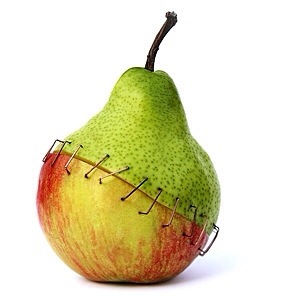This is a great article by Alice Elliot Brown on GMO’s, organic & GMO seed pollen contaminating our food.
Can GMO Be Called Organic?

GMO Seeds
GMO Food: Genetically-modified organisms. This refers to the act of scientifically modifying the genetic structure of an organism. The resultant organism will have specifically defined characteristics.
This is frequently done with seeds for crops. In the U.S., most of our soybeans, corn, cotton, and canola are genetically modified.
Recently, the U.S. allowed GMO alfalfa to be planted without restriction. The genetically modified seeds can be patented. After all, the research to make them costs money. The argument for seed patents is that the investor must receive a return, or there will be no more investment money for research.
GMO & Organic Contamination
Until recently, I assumed GMO food could not be called “organic.” The U.S. and Canada both prohibit 100% certified organic food from containing GMO ingredients. However, contamination of the crops may cause organic feed to contain some percentage of GMO ingredients.
At the Straus Family Creamery in California, for example, Farmer Straus spent nearly $10,000 tracing back the ingredients in his organic supplies, to remove the GMO traces. Basically, the problem is that GMO crops spew pollen into the air, as all crops do. This pollen cross-breeds with organic feed, which pollutes and corrupts the organic farms.
It is a normal practice for organic farmers to save their seed for the next year. With GMO crops growing nearby, however, the organic crops become infected with the GMO seed. When the farmer saves his seed, he is then infringing on Monsanto Corporation’s patent.
Monsanto issued policies about patent infringement and their methods of enforcing patent law on these seeds. In these policies, Monsanto takes the position that their patented seed is desirable, and therefore the farmers who normally save their own seed are taking something away from the company.
Organic farmers point out that they are no longer organic when their seed is contaminated by genetically-engineered cross-pollination. They are the victim, not the perpetrator. The Monsanto Corporation protests that it has sued only 145 farmers for patent violation.
Meanwhile, the Organic Consumers Organization has organized a Millions Against Monsanto campaign to pressure Congress to force foods to be labeled as GMO. This would allow consumers to decide whether they will risk their health with GMO foods. The FDA does not determine whether or not GMO is safe. It only determines whether evidence has been provided to declare it unsafe.
No evidence, no reason not to eat it.
Of course, whether GMO food is safe will not be determined until after people have eaten it for 20 or more years. By that time, non-GMO seeds may no longer be available on the planet, as the wind and the birds cross-pollinate our fields. Although dramatic increases in the incidence of allergies and immune system diseases have occurred over the last 20 years, science have not been able to identify why this has happened.















